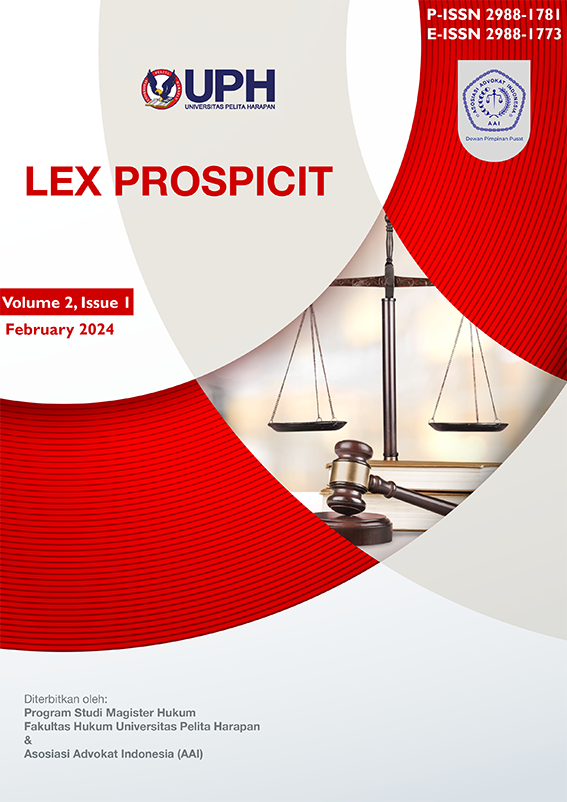Protection of Minority Shareholders from Fraud in Limited Liability Company Dividend Distribution
DOI:
https://doi.org/10.19166/lp.v2i1.8020Trefwoorden:
Financial Technology, Peer-to-Peer Lending, Financial Services AuthoritySamenvatting
This research investigates the potential fraudulent actions carried out by majority shareholders and other corporate organs in the context of stock distribution. The primary focus is on the continuity of practices that may disadvantage minority shareholders and undermine the legal protections they should receive. Majority shareholders, often wielding significant influence in the General Meeting of Shareholders (RUPS), may exploit their power to manipulate decisions related to stock distribution. The presence of a quorum that can be achieved without the participation of minority shareholders increases the risk of fraud in this process. The aim of this research is to identify various fraudulent actions that may occur in stock distribution by majority shareholders and related corporate organs. Using a legal analysis approach and case studies, this research also explores ways in which minority shareholders might prevent or respond to fraudulent actions. Furthermore, the research examines the extent to which Law No. 40 of 2007 concerning Limited Liability Companies (UU PT) provides a legal basis to prevent and respond to fraudulent actions in stock distribution. Practical implications of potential fraud are analyzed to provide recommendations that can strengthen legal protections for minority shareholders. This research is expected to contribute to a deeper understanding of the dynamics of fraud in stock distribution, outline the legal challenges faced by minority shareholders, and formulate concrete steps to prevent and respond to such fraud in companies.
Referenties
Law and Regulations
Undang-Undang Nomor 40 Tahun 2007 tentang Perseroan Terbatas. Lembaran Negara Republik Indonesia Tahun 2007 Nomor 106, Tambahan Lembaran Negara Republik Indonesia Nomor 4756.
Books
Fuady, Munir. Hukum Tentang Akuisisi: Take Over dan LBO. Bandung: PT Citra Adiyta Bakti, 2014.
Fuady, Munir. Perseroan Terbatas Paradigma Terbaru. Bandung: PT Citra Aditya Bakti, 2003.
Harahap, Yahya. Hukum Perseroan Terbatas. Jakarta: Sinar Grafika, 2009.
Widjaja, Gunawan. Hak Individu dan Kolektif Para Pemegang Saham. Jakarta: Praninta Offset, 2008.
Journal Articles
Subagiyo, Dwi Tatak. “Perlindungan Hukum Pemegang Saham Minoritas Akibat Perbuatan Melawan Hukum Direksi Menurut Undang-Undang Perseroan Terbatas.” Perspektif 20, no. 1 (January 2015): 49-58. https://doi.org/10.30742/perspektif.v20i1.122.
Gunadi, Ni Luh Dwik Suryacahyani, and Jose Widyatama. “Perhitungan Sebagai Seorang Investor Saham Atas Besaran Pajak Yang Harus Dibayarkan Kepada Negara.” Jurnal Locus Delicti 2, no. 1 (April 2021): 13-23. https://doi.org/10.23887/jld.v2i1.455.
Shobah, Shofia. “Perbedaan Penerapan Derivative Action Di Indonesia Sebagai Negara Civil Law Dibandingkan Dengan Negara-Negara Penganut Sistem Hukum Common Law (Studi Putusan Perdata Nomor 02/Pdt.G/2010/PN.Jkt.Sel).” Jurnal Hukum & Pembangunan 48, no. 4 (October-December 2018): 791-813. https://scholarhub.ui.ac.id/jhp/vol48/iss4/6/.
Butar-Butar, Hendy Martin, Budiman N.D.P Sinaga, and Tulus Siambaton. “Perlindungan Hukum Terhadap Pemegang Saham Minoritas Pada Perusahaan Terbuka.” Patik: Jurnal Hukum 7, no. 2 (August 2018): 137-151. https://ejournal.uhn.ac.id/index.php/patik/article/view/290.
##submission.downloads##
Gepubliceerd
Citeerhulp
Nummer
Sectie
Licentie
Copyright (c) 2024 Stefanie Hartanto

Dit werk wordt verdeeld onder een Naamsvermelding-GelijkDelen 4.0 Internationaal licentie.
Authors who publish with this journal agree to the following terms:
1) Authors retain copyright and grant the journal right of first publication with the work simultaneously licensed under a Creative Commons Attribution License (CC-BY-SA 4.0) that allows others to share the work with an acknowledgement of the work's authorship and initial publication in this journal.
2) Authors are able to enter into separate, additional contractual arrangements for the non-exclusive distribution of the journal's published version of the work (e.g., post it to an institutional repository or publish it in a book), with an acknowledgement of its initial publication in this journal.
3) Authors are permitted and encouraged to post their work online (e.g., in institutional repositories or on their website). The final published PDF should be used and bibliographic details that credit the publication in this journal should be included.


